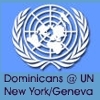

| BRIEFING - September 21, 2011 | To learn more about the Millenium Development Goals, click on the graphic Past Briefings: September 7, 2011 August 24, 2011 August 10, 2011 June 22, 2011 June 8, 2011 May 11, 2011 April 27, 2011 April 6, 2011 March 23, 2011 March 9, 2011 February 9, 2011 January 26, 2011 January 12, 2011 |
|
General Assembly underway; International Day of Peace The 66th Session of the General Assembly formally opened on Sept. 13. The president for this year’s session is Mr. Nassir Abdulaziz Al-Nasser, from Qatar. On assuming his position, Mr. Al-Nasser said, “The road to success must be founded on the principle of partnership and on a deep sense of justice and responsibility… The 66th Session of the General Assembly is … our opportunity to prove that we … have the courage, tenacity and wisdom to seek creative and visionary solutions. That we can work together to produce results … And that when faced with those few who choose force and brutality, we choose peace, human rights and democracy.” Mr. Al-Nasser has identified four main areas of focus to help frame the work of this session: the peaceful settlement of disputes; UN reform and revitalization; improving disaster prevention and response; and sustainable development and global prosperity. Acknowledging the 50th anniversary of the death of Dag Hammarskjold, the second Secretary General of the United Nations, Mr. Al-Nasser urged his colleagues to draw inspiration from Mr. Hammarskjold’s strong commitment to peace, international cooperation and the universality of the United Nations. One of Mr. Hammarskjold’s most significant contributions to the UN was the creation of a Meditation Room. Hammarskjold wrote of this space, “We all have within us a centre of stillness surrounded by silence. This house, dedicated to work and debate in the service of peace, should have one room dedicated to silence in the outward sense, and stillness in the inner sense. It has been the aim to create in this small room a place where the doors may be open to the infinite lands of thought and prayer.” May the “work and debate in the service of peace” which will be realized throughout this session of the General Assembly yield a harvest of peace for all people, and for our one, fragile home—Earth. And now, a word about the International Day of Peace, from our Dominican Volunteer, Alexandra Sajben.
Within the last 20 years, a new trend of thought has emerged in the field of conflict resolution. In 1996, a man named Johan Galtung differentiated between “positive peace” and “negative peace.” Positive peace was defined as “the integration of human society,” while negative peace was “the absence of violence, absence of war.” It is extremely important, then, to note that the absence of violence is not peace—at least, not the type of peace which we should strive to attain. Stopping violence is not enough. The international community must take preventative measures to ensure that large-scale conflict does not occur again and again. It is not enough to present the problematic aspects of violence—we must work towards a solution. To put an end to cyclical violence, the underlying issues need to be addressed. As Dominicans, we must do our best to speak truth to power by ensuring that the United Nations does its best to address the issues that cause conflict. Education, addressing the needs of the impoverished and hungry, and promoting sustainable development are all essential aspects of peace building. By funding efforts to provide basic human needs, the UN can work towards positive peace. While action is not always immediate, gradual progress is made. For the first time, Tunisia recently became a signatory without reservations to CEDAW, Convention on the Elimination of All Forms of Discrimination against Women. The recognition of gender equality will only serve to increase positive peace and lessen the tensions from which conflict stems. As we celebrate the International Day of Peace, we should all take a moment to examine how we are working towards positive peace in our own lives.
|
Dominican Leadership Conference
Building relationships and collaborating in the mission of preaching the Gospel
29000 West Eleven Mile Road
Farmington Hills MI 48336
248-536-3234 Contact: Executive Director
 Every year, the United Nations recognizes September 21 as the International Day of Peace. The Peace Bell, cast from the metal of coins given by children around the world, has been rung in New York annually since 1982. This bell was given as a gift by Japan, as a reminder of the “human cost of war.” On this day, people around the world are called to remember that peace is, as Ban Ki-Moon so eloquently put it, “one of humanity’s most precious needs.”
Every year, the United Nations recognizes September 21 as the International Day of Peace. The Peace Bell, cast from the metal of coins given by children around the world, has been rung in New York annually since 1982. This bell was given as a gift by Japan, as a reminder of the “human cost of war.” On this day, people around the world are called to remember that peace is, as Ban Ki-Moon so eloquently put it, “one of humanity’s most precious needs.” 